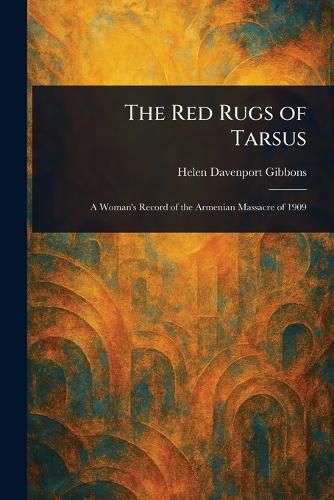Readings Newsletter
Become a Readings Member to make your shopping experience even easier.
Sign in or sign up for free!
You’re not far away from qualifying for FREE standard shipping within Australia
You’ve qualified for FREE standard shipping within Australia
The cart is loading…






This title is printed to order. This book may have been self-published. If so, we cannot guarantee the quality of the content. In the main most books will have gone through the editing process however some may not. We therefore suggest that you be aware of this before ordering this book. If in doubt check either the author or publisher’s details as we are unable to accept any returns unless they are faulty. Please contact us if you have any questions.
"The Red Rugs of Tarsus: A Woman's Record of the Armenian Massacre of 1909" offers a firsthand historical account of a tragic period in Turkish history. Helen Davenport Gibbons provides a unique perspective on the Adana massacre, focusing on events as they unfolded in Tarsus, Turkey. This meticulously prepared edition sheds light on the tumultuous events of 1909, a time marked by immense suffering and upheaval. Gibbons' record captures the atmosphere and impact of the Armenian massacre, offering invaluable insights for those interested in the history of the region. A vital historical document, this book illuminates a dark chapter in the Ottoman Empire, providing a poignant and enduring testament to a critical moment in history. It will appeal to readers interested in Middle Eastern history, European history, and historical biography.
This work has been selected by scholars as being culturally important, and is part of the knowledge base of civilization as we know it.
This work is in the public domain in the United States of America, and possibly other nations. Within the United States, you may freely copy and distribute this work, as no entity (individual or corporate) has a copyright on the body of the work.
Scholars believe, and we concur, that this work is important enough to be preserved, reproduced, and made generally available to the public. We appreciate your support of the preservation process, and thank you for being an important part of keeping this knowledge alive and relevant.
$9.00 standard shipping within Australia
FREE standard shipping within Australia for orders over $100.00
Express & International shipping calculated at checkout
This title is printed to order. This book may have been self-published. If so, we cannot guarantee the quality of the content. In the main most books will have gone through the editing process however some may not. We therefore suggest that you be aware of this before ordering this book. If in doubt check either the author or publisher’s details as we are unable to accept any returns unless they are faulty. Please contact us if you have any questions.
"The Red Rugs of Tarsus: A Woman's Record of the Armenian Massacre of 1909" offers a firsthand historical account of a tragic period in Turkish history. Helen Davenport Gibbons provides a unique perspective on the Adana massacre, focusing on events as they unfolded in Tarsus, Turkey. This meticulously prepared edition sheds light on the tumultuous events of 1909, a time marked by immense suffering and upheaval. Gibbons' record captures the atmosphere and impact of the Armenian massacre, offering invaluable insights for those interested in the history of the region. A vital historical document, this book illuminates a dark chapter in the Ottoman Empire, providing a poignant and enduring testament to a critical moment in history. It will appeal to readers interested in Middle Eastern history, European history, and historical biography.
This work has been selected by scholars as being culturally important, and is part of the knowledge base of civilization as we know it.
This work is in the public domain in the United States of America, and possibly other nations. Within the United States, you may freely copy and distribute this work, as no entity (individual or corporate) has a copyright on the body of the work.
Scholars believe, and we concur, that this work is important enough to be preserved, reproduced, and made generally available to the public. We appreciate your support of the preservation process, and thank you for being an important part of keeping this knowledge alive and relevant.